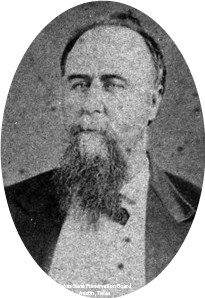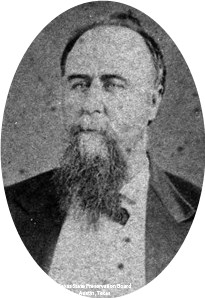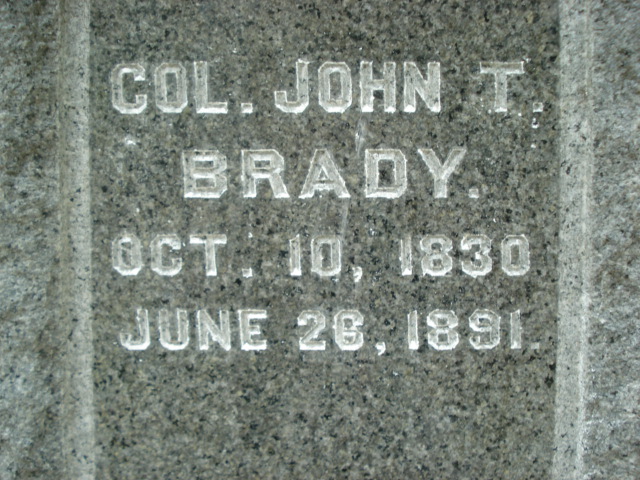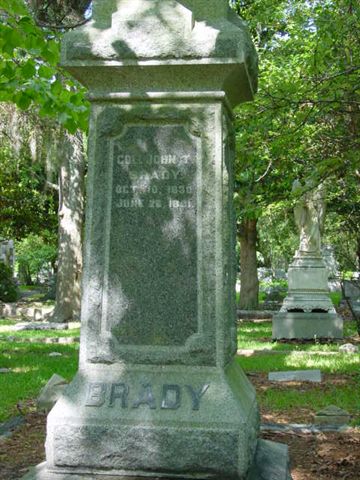Parents: John T. Brady and Mary Davis
(1) Spouse: Caladonia A. Tinsley
Marriage: April 1, 1858, Brazoria, Texas
(2) Spouse: Lennie Sherman
Marriage: Nov 24, 1880, Harris Co., Texas.
Contributor: Sherry (47010546)
~
BRADY, Col. JOHN T.
The subject of this sketch was born October 10, 1830, in Charles county, Maryland. His parents were John and Mary Brady, who were also natives of Maryland, and in that State his people have lived for many generations, his ancestors in fact having settled there, as part of Lord Baltimore's colony, in 1634. His father was a farmer, as were also most of his antecedents. They were plain, substantial people, up to the average of their class in thrift, industry and intelligence, and the possessors of moderate means. The father served in the war of 1812, but with the exception of the services rendered in this capacity never filled any other position of a civil or military nature.
There were four children in the family to which the subject of this sketch belonged, two sons and two daughters, he being the eldest of the number. The only other survivor of the four is William Brady, who is now a resident of Houston. The daughters, Mrs. Emily McCuin and Mrs. Elizabeth Hauptman, both died in recent years, at their homes in Washington city, at which place the parents also died.
John T. Brady was reared in his native county, in the schools of which he received his elementary education. His training ceased, so far as the schools were concerned, with a term or two at a local academy, and at the age of seventeen he undertook the serious duties of life for himself. He began his career as a teacher and for a period of some four years gave his attention exclusively to schoolroom work. In this way he earned the money with which to buy books to complete his education, studying in private, and to prepare himself for entry to the profession of law, a profession which he early determined to take up for his life work. He was admitted to the bar the year he attained his majority, and began practice in the courts of his native State. But two years later he went West and settled at Westport, now part of Kansas City, Missouri, where he secured an interest in a newspaper and engaged in journalistic work and in the practice of his profession for another period of about two years. Then, in 1856, on account of the rigor of the winters in that latitude, he gave up his residence there and came to Texas, locating at Houston. Here he laid journalism aside and entered vigorously and exclusively in the practice of the law. He soon rose to prominence in his profession, and came to be known as a man of much energy, keen intellect and admirable social qualities.
March 31, 1858, he married Caledonia, the accomplished daughter of Colonel John T. Tinsley, a wealthy planter of Brazoria county, and thus formed the first of those ties by which he was to become so strongly attached to the people of Texas and they to him.
From 1856 to 1861 Mr. Brady gave but little attention to any pursuits or interests outside of his profession. He did not even concern himself very much with current politics, although he, of necessity, had to take some part in passing events. His law practice was seriously interrupted by the war, but he continued at it more or less from 1861 to 1865, and at the close of hostilities actively resumed his professional pursuits.
In 1863 he was elected to the State Legislature; re-elected in 1866, and thus represented Harris county in the tenth and eleventh sessions of that body, in each of which sessions he achieved considerable reputation, serving as chairman of the Finance Committee in the tenth session and as chairman of the Committee on Internal Improvements in the eleventh.
In the early seventies he originated the idea of the Texas State Fair, organized the machinery necessary to put it in motion and by his persistent effort and judicious counsel made a success of it. He was its first president, and served in this capacity for a number of years. The idea was also his of having the great farmer-editor, Horace Greeley, open the fair, and while here meet the people of this great State and learn from actual observation something of their latent wealth, their hospitality and especially their personal respect for him as the bondsman of Jefferson Davis and the author of that genuine American sentiment, "We are now all Americans."
In 1878 Colonel Brady was elected to the State Senate and represented his district in the seventeenth session of the Legislature. In this session he served as chairman of the Committee on Public Debt, and added still further to his reputation as an earnest and thoughtful lawmaker. In 1880 he was a candidate against Colonel Roger O. Mills for Congress, and, although defeated, he polled a very flattering vote, carrying a number of counties in the district.
As a lawyer Colonel Brady's standing was always high. He was early honored with a good clientage, and, coming to the State so early, he had to do, at one time and another, with many important questions, the determination of which now forms the recognized and finally settled system of the State's jurisprudence. But few men strived harder to deserve the confidence of clients or to win the esteem of the courts. When he undertook a case he devoted all of his mental and physical energies to it, making his client's cause his own and exhausting every resource of the law to attain what he believed to be just and right. His mind was vigorous and active; its resources rich and varied, and constantly at his command. He possessed a ripened judgment, and, barring a rapid speech and energetic style of delivery, was a strong and effective orator.
Colonel Brady was always noted as a promoter of large enterprises and a leader in financial circles, and even in the midst of a large and lucrative law practice he was constantly absorbed in some measure of development. His last, which he seems to have hoped to make the crowning work of his life, was the construction of a belt railway connecting all the lines centering at Houston, the opening of a deep-water port at the junction of Buffalo and Bray's bayous near the old town of Harrisburg and the improvement of a public park suitable to the growing demands of a seat of wealth, culture and refinement like Houston. No man could possibly take a mental survey of the work which Colonel Brady proposed for himself without being moved with the magnitude of the conception and filled with regret that its generous and farseeing architect was not permitted to carry it out. The railroad, incorporated under the name of the Houston Belt & Magnolia Park Railway, was nearly finished; the harbor and wharves were put far on the road to completion and the work of beautifying and rendering attractive the portion of land set aside for the park was progressing well, when all his plans and purposes, all the labor thus far performed and all the happy anticipations of the author and designer were brought to naught by the stern decree of fate. On the 26th of June, 1890, in the very midst of his labors, and while inspecting some work being done on a new wharf at Port Houston, he was stricken one day with cerebral effusion, from the effects of which he soon passed away. News of his death throughout the city was received with the deepest sorrow and regret, and his great loss to Texas was generally recognized throughout the State. His remains were buried at Glenwood cemetery.
It is stated with pride by those who knew Colonel Brady that he was an honest and capable lawyer, a wise and able legislator, a man of surpassing energy and undaunted courage, and of boundless faith in the future of his State. He early foresaw the advantages of Houston's water-way to the Gulf and never lost an opportunity to set forth these advantages on all proper occasions. He attended all the deep-water conventions held throughout the West, and in speeches before these, as well as by judicious advertising, did much to attract settlers and capitalists to this city and vicinity. It was always his belief that Houston would be the greatest city in the Southwest, and he showed his faith in the place by holding steadfastly to his investments here. He was also a man of great heart as well as great brain; a man of large sympathies, fine feelings and full of that kind of ambition which had in it nothing selfish or mean. He gave liberally of his means for the relief of the wants of his fellow-creatures and although he made no pretention as a church member he gave in the true spirit of Christianity, never allowing the right hand to know what the left had did.
Colonel Brady's wife, Caledonia Tinsley Brady, preceded him to the grave by many years, as did also a second wife, Lennie Sherman Brady, daughter of the distinguished soldier and civilian, General Sidney Sherman. Colonel Brady was three times married and left surviving him a widow and three children, two by his second marriage, Lucy Sherman Brady and Sidney Sherman Brady; and one by his last, Mary Henrietta Brady. (Source: History of Texas Biographical History of the Cities of Houston and Galveston (1895)
Parents: John T. Brady and Mary Davis
(1) Spouse: Caladonia A. Tinsley
Marriage: April 1, 1858, Brazoria, Texas
(2) Spouse: Lennie Sherman
Marriage: Nov 24, 1880, Harris Co., Texas.
Contributor: Sherry (47010546)
~
BRADY, Col. JOHN T.
The subject of this sketch was born October 10, 1830, in Charles county, Maryland. His parents were John and Mary Brady, who were also natives of Maryland, and in that State his people have lived for many generations, his ancestors in fact having settled there, as part of Lord Baltimore's colony, in 1634. His father was a farmer, as were also most of his antecedents. They were plain, substantial people, up to the average of their class in thrift, industry and intelligence, and the possessors of moderate means. The father served in the war of 1812, but with the exception of the services rendered in this capacity never filled any other position of a civil or military nature.
There were four children in the family to which the subject of this sketch belonged, two sons and two daughters, he being the eldest of the number. The only other survivor of the four is William Brady, who is now a resident of Houston. The daughters, Mrs. Emily McCuin and Mrs. Elizabeth Hauptman, both died in recent years, at their homes in Washington city, at which place the parents also died.
John T. Brady was reared in his native county, in the schools of which he received his elementary education. His training ceased, so far as the schools were concerned, with a term or two at a local academy, and at the age of seventeen he undertook the serious duties of life for himself. He began his career as a teacher and for a period of some four years gave his attention exclusively to schoolroom work. In this way he earned the money with which to buy books to complete his education, studying in private, and to prepare himself for entry to the profession of law, a profession which he early determined to take up for his life work. He was admitted to the bar the year he attained his majority, and began practice in the courts of his native State. But two years later he went West and settled at Westport, now part of Kansas City, Missouri, where he secured an interest in a newspaper and engaged in journalistic work and in the practice of his profession for another period of about two years. Then, in 1856, on account of the rigor of the winters in that latitude, he gave up his residence there and came to Texas, locating at Houston. Here he laid journalism aside and entered vigorously and exclusively in the practice of the law. He soon rose to prominence in his profession, and came to be known as a man of much energy, keen intellect and admirable social qualities.
March 31, 1858, he married Caledonia, the accomplished daughter of Colonel John T. Tinsley, a wealthy planter of Brazoria county, and thus formed the first of those ties by which he was to become so strongly attached to the people of Texas and they to him.
From 1856 to 1861 Mr. Brady gave but little attention to any pursuits or interests outside of his profession. He did not even concern himself very much with current politics, although he, of necessity, had to take some part in passing events. His law practice was seriously interrupted by the war, but he continued at it more or less from 1861 to 1865, and at the close of hostilities actively resumed his professional pursuits.
In 1863 he was elected to the State Legislature; re-elected in 1866, and thus represented Harris county in the tenth and eleventh sessions of that body, in each of which sessions he achieved considerable reputation, serving as chairman of the Finance Committee in the tenth session and as chairman of the Committee on Internal Improvements in the eleventh.
In the early seventies he originated the idea of the Texas State Fair, organized the machinery necessary to put it in motion and by his persistent effort and judicious counsel made a success of it. He was its first president, and served in this capacity for a number of years. The idea was also his of having the great farmer-editor, Horace Greeley, open the fair, and while here meet the people of this great State and learn from actual observation something of their latent wealth, their hospitality and especially their personal respect for him as the bondsman of Jefferson Davis and the author of that genuine American sentiment, "We are now all Americans."
In 1878 Colonel Brady was elected to the State Senate and represented his district in the seventeenth session of the Legislature. In this session he served as chairman of the Committee on Public Debt, and added still further to his reputation as an earnest and thoughtful lawmaker. In 1880 he was a candidate against Colonel Roger O. Mills for Congress, and, although defeated, he polled a very flattering vote, carrying a number of counties in the district.
As a lawyer Colonel Brady's standing was always high. He was early honored with a good clientage, and, coming to the State so early, he had to do, at one time and another, with many important questions, the determination of which now forms the recognized and finally settled system of the State's jurisprudence. But few men strived harder to deserve the confidence of clients or to win the esteem of the courts. When he undertook a case he devoted all of his mental and physical energies to it, making his client's cause his own and exhausting every resource of the law to attain what he believed to be just and right. His mind was vigorous and active; its resources rich and varied, and constantly at his command. He possessed a ripened judgment, and, barring a rapid speech and energetic style of delivery, was a strong and effective orator.
Colonel Brady was always noted as a promoter of large enterprises and a leader in financial circles, and even in the midst of a large and lucrative law practice he was constantly absorbed in some measure of development. His last, which he seems to have hoped to make the crowning work of his life, was the construction of a belt railway connecting all the lines centering at Houston, the opening of a deep-water port at the junction of Buffalo and Bray's bayous near the old town of Harrisburg and the improvement of a public park suitable to the growing demands of a seat of wealth, culture and refinement like Houston. No man could possibly take a mental survey of the work which Colonel Brady proposed for himself without being moved with the magnitude of the conception and filled with regret that its generous and farseeing architect was not permitted to carry it out. The railroad, incorporated under the name of the Houston Belt & Magnolia Park Railway, was nearly finished; the harbor and wharves were put far on the road to completion and the work of beautifying and rendering attractive the portion of land set aside for the park was progressing well, when all his plans and purposes, all the labor thus far performed and all the happy anticipations of the author and designer were brought to naught by the stern decree of fate. On the 26th of June, 1890, in the very midst of his labors, and while inspecting some work being done on a new wharf at Port Houston, he was stricken one day with cerebral effusion, from the effects of which he soon passed away. News of his death throughout the city was received with the deepest sorrow and regret, and his great loss to Texas was generally recognized throughout the State. His remains were buried at Glenwood cemetery.
It is stated with pride by those who knew Colonel Brady that he was an honest and capable lawyer, a wise and able legislator, a man of surpassing energy and undaunted courage, and of boundless faith in the future of his State. He early foresaw the advantages of Houston's water-way to the Gulf and never lost an opportunity to set forth these advantages on all proper occasions. He attended all the deep-water conventions held throughout the West, and in speeches before these, as well as by judicious advertising, did much to attract settlers and capitalists to this city and vicinity. It was always his belief that Houston would be the greatest city in the Southwest, and he showed his faith in the place by holding steadfastly to his investments here. He was also a man of great heart as well as great brain; a man of large sympathies, fine feelings and full of that kind of ambition which had in it nothing selfish or mean. He gave liberally of his means for the relief of the wants of his fellow-creatures and although he made no pretention as a church member he gave in the true spirit of Christianity, never allowing the right hand to know what the left had did.
Colonel Brady's wife, Caledonia Tinsley Brady, preceded him to the grave by many years, as did also a second wife, Lennie Sherman Brady, daughter of the distinguished soldier and civilian, General Sidney Sherman. Colonel Brady was three times married and left surviving him a widow and three children, two by his second marriage, Lucy Sherman Brady and Sidney Sherman Brady; and one by his last, Mary Henrietta Brady. (Source: History of Texas Biographical History of the Cities of Houston and Galveston (1895)
Family Members
Advertisement
Records on Ancestry
Advertisement





















